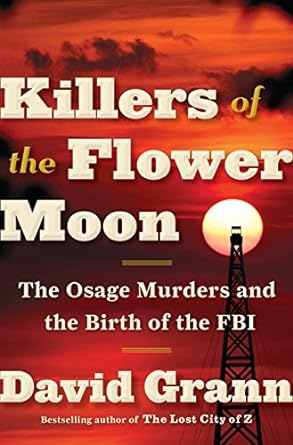Killers of the Flower Moon, by David Grann
Oct 10
2023

The first third of David Grann's 2017 nonfiction book Killers of the Flower Moon is structured like a mystery novel, and—trust me on this—readers are best off knowing as little about the "plot" as possible. I was unfortunately already familiar with the fates of most of the people involved, and it made for the kind of claustrophobic, creepifying reading experience that lingers.
Grann's book centers around a series of murders that took place in Osage County, Oklahoma, in the 1920s. When large oil deposits were discovered underneath the Osage's reservation lands, the tribal members suddenly became unbelievably wealthy. While the Osage had done their best to legally protect the tribe's newfound wealth, a comprehensively racist law passed by the U.S. Congress assigned nearly all of the tribal members a White "guardian" who would manage their assets. As the tribe's oil rights could only be inherited, not sold, anywhere from a few dozen to several hundred Osage tribal members suddenly began turning up dead, further concentrating the wealth in the hands of a ever-more-vulnerable group of survivors.
While the first third of the book reads like a horrifying (albeit memorable) novel, the second two-thirds are less satisfying, although that's more of a "reality" problem than a storytelling issue. The middle section focuses on the introduction of agents from the Bureau of Investigation (an earlier version of the FBI) and their attempts to solve the increasingly brazen series of murders and obvious cover-ups. The final bit of the book is in some ways the most upsetting of all—while readers will feel that the mystery introduced earlier in the narrative has been resolved, Grann starts to explore the victims who received even less justice, and the nameless perpetrators who undoubtedly got away with murder.
My father's family is Alaskan Native, but without that personal tie I'm very aware of how little I would know about Indigenous history. In my experience, U.S. schools do a terrible job of covering Native issues, depicting them as figures of the distant past who basically disappeared from the national narrative as White settlers expanded across the continent. I am nursing at least a little hope for the cultural impact of the upcoming film adaptation of Killers of the Flower Moon—if it's a big enough deal, maybe schools will start recognizing that the Native experience is relevant, ongoing, and a vital part of the larger American story.
Grann's book centers around a series of murders that took place in Osage County, Oklahoma, in the 1920s. When large oil deposits were discovered underneath the Osage's reservation lands, the tribal members suddenly became unbelievably wealthy. While the Osage had done their best to legally protect the tribe's newfound wealth, a comprehensively racist law passed by the U.S. Congress assigned nearly all of the tribal members a White "guardian" who would manage their assets. As the tribe's oil rights could only be inherited, not sold, anywhere from a few dozen to several hundred Osage tribal members suddenly began turning up dead, further concentrating the wealth in the hands of a ever-more-vulnerable group of survivors.
While the first third of the book reads like a horrifying (albeit memorable) novel, the second two-thirds are less satisfying, although that's more of a "reality" problem than a storytelling issue. The middle section focuses on the introduction of agents from the Bureau of Investigation (an earlier version of the FBI) and their attempts to solve the increasingly brazen series of murders and obvious cover-ups. The final bit of the book is in some ways the most upsetting of all—while readers will feel that the mystery introduced earlier in the narrative has been resolved, Grann starts to explore the victims who received even less justice, and the nameless perpetrators who undoubtedly got away with murder.
My father's family is Alaskan Native, but without that personal tie I'm very aware of how little I would know about Indigenous history. In my experience, U.S. schools do a terrible job of covering Native issues, depicting them as figures of the distant past who basically disappeared from the national narrative as White settlers expanded across the continent. I am nursing at least a little hope for the cultural impact of the upcoming film adaptation of Killers of the Flower Moon—if it's a big enough deal, maybe schools will start recognizing that the Native experience is relevant, ongoing, and a vital part of the larger American story.
Posted by: Julianka
No new comments are allowed on this post.
Comments
No comments yet. Be the first!